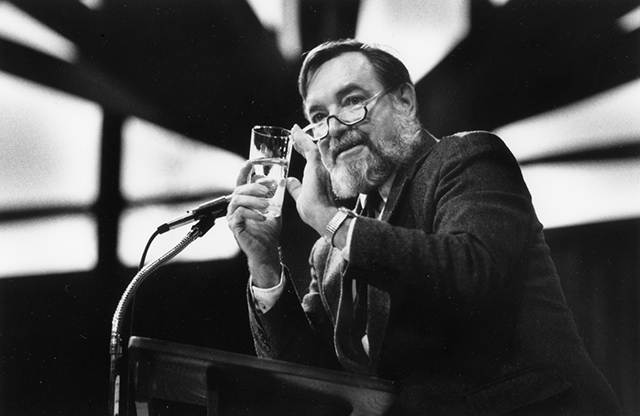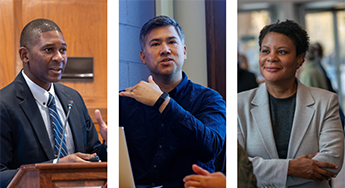Remembering John McKnight, Community Development Pioneer (1931–2024)
He empowered communities to adopt a 'glass half-full' perspective
Get all our news
[McKnight] was an extraordinary man and thinker. His influence on me and dozens of others over the years is hard to calculate.”
Dan Lewis
IPR faculty emeritus

John McKnight illustrates his approach during his 2003 IPR Distinguished Public Policy Lecture “Regenerating Community: The Recovery of a Space for Citizens.”
John McKnight, professor emeritus of speech and urban affairs at Northwestern University and one of the co-founders of the Center for Urban Affairs—now the Institute for Policy Research (IPR)—passed away on Nov. 2 at his home in Evanston, Ill. He was 92.
A visionary in community organizing and civil rights, McKnight spent his six-decade career advancing what he termed “asset-based” approaches to community development. His philosophy centered on a simple yet revolutionary premise: that all communities have inherent strengths and resources that they can leverage to create lasting, self-sustaining change.
This approach, later formalized as the Asset-Based Community Development (ABCD) model, shifted how practitioners, researchers, and policymakers engage with communities. McKnight’s impact reaches far beyond Northwestern, touching communities and organizations in the U.S. and abroad that continue to draw from his insights on collective empowerment.
“[McKnight] was an extraordinary man and thinker,” said Northwestern professor and IPR faculty emeritus Dan Lewis. “His influence on me and dozens of others over the years is hard to calculate.”
Beginnings of a Visionary Career
McKnight began his journey to becoming a leader in community development and social policy as a Northwestern undergraduate protesting discriminatory university policies in the 1950s. After graduating, he went on to serve in the Navy, lead the Illinois American Civil Liberties Union, shape federal affirmative action policy under President John F. Kennedy, and direct the Midwest division of the U.S. Commission on Civil Rights.
In 1969, McKnight rejoined his alma mater as a founding member of the Center for Urban Affairs (CUA), an initiative launched by faculty committed to addressing the complex challenges facing American cities. Against the social unrest of the late 1960s, CUA sought to use research as a tool to address issues related to urban inequality, poverty, and racial justice. McKnight was brought on board to lend on-the-ground knowledge of communities to the new center. “With a joyous demeanor and a warm manner, he exposed academic conceits that undermined community health,” Lewis said.
McKnight’s contributions as CUA’s first associate director were instrumental in shaping its agenda, with notable projects focused on exposing discriminatory practices. Alongside colleagues—sociologist Andrew Gordon, law professor Leonard Rubinowitz, and economist Marcus Alexis—he investigated redlining, a practice in which banks systematically denied mortgages and other financial services to people in minority neighborhoods. This research laid the groundwork for legislation like the Community Reinvestment Act and the Home Mortgage Disclosure Act.
Legacy at Northwestern and Beyond
In the 1980s and 1990s, as CUA expanded its focus and became the Institute for Policy Research, McKnight continued to drive applied research forward. He and collaborator Jody Kretzmann published their classic handbook Building Communities from the Inside Out in 1993, formalizing their asset-based approach to community development. This work led to the founding of the ABCD Institute at Northwestern in 1995, establishing a model that would become foundational in community development practices worldwide.
Under McKnight’s guidance, CUA not only shaped Northwestern’s approach to community engagement but also left a lasting mark on the fields of urban studies and social policy. His ideas helped establish a broader understanding of “community” as a force for meaningful change and inspired a new generation of community leaders. The ABCD model has since been adopted internationally and serves as a guiding framework in sectors ranging from public health and education to urban planning and environmental conservation. Emphasizing a "glass half-full" perspective, McKnight’s work revealed the potential for positive change when communities focus on their strengths.
McKnight’s legacy at IPR and beyond reflects his belief that research institutions have a responsibility not just to study social issues but to engage actively with communities to solve them. More than 50 years after IPR’s founding, his principles continue to buttress much of its work and his example inspires scholars and practitioners alike.
“I learned an immense amount from [McKnight] both substantively and…interactively, that is, the way he communicated with others,” Lewis said. “He stuck to his analysis. He never belittled those with whom he disagreed. He treated people with respect and warmth and he stayed on his message his whole life.”
McKnight is survived by his wife, Marsha Barnett, his son, stepchildren, grandchildren, and his many colleagues and friends.
Photo credit: Jason Reblando
Published: November 15, 2024.


